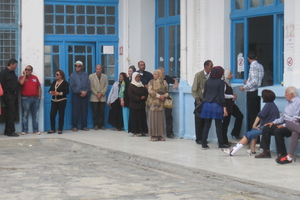By Amnesty International’s research team on Tunisia.

Horns honked, children waved Tunisian flags, old men posed merrily for cameras and queues of voters spilled into school yards yesterday as Tunisians went to the polls in the first elections under the country’s new constitution, nearly four years after they took to the streets to protest against years of repression and abuse. Their enthusiasm was palpable, yet the success of the electoral process so far should not mask darker realities that persist in Tunisia.
Since the 2010-2011 uprising that ousted the former president Zine el Abidine Ben Ali, human rights violations have endured.
This has been evident since we arrived in Tunis, where we watched families protesting against the torture of their loved ones at the hands of the security forces and calling for justice and accountability. Their stories backed up the reports we had been receiving for several weeks of cases of torture and deaths in custody.
Little is still known about the structure of the Tunisian security forces, which have not been reformed since the uprising.
Government officials and politicians claim that security is of prime importance following two political assassinations in 2013 and increased instability on Tunisia’s borders with Algeria and Libya, which the authorities have blamed on “terrorist” cells. But this has raised worrying questions about human rights.
Just 48 hours before the elections, the security forces laid siege and stormed a house in a suburb of Tunis where gunmen were believed to be hiding, killing five women and a man and injuring a child in the process. The day before, an officer from the National Guard was killed in the stand-off.
Impunity was one of the hallmarks of Ben Ali’s rule, yet the current authorities have also used security threats as an excuse to let members of the security forces get away with human rights violations.
In August, two women were shot dead by police officers in Kasserine as they drove back home late at night from a wedding. The Ministry of Interior told us that the police officers had not been suspended, nor were they facing an internal investigation, as he said the death of the two women was the result of a “mistake” committed while they were protecting the area from terrorist threats.
Tunisia’s counter-terrorism operations should not be used as an excuse to let security forces escape prosecution for the violations they commit.
We were starkly reminded of the authorities’ infringement of other human rights when we met former prisoner of conscience Jabeur Mejri, who was pardoned for the second time on 14 October.
Jabeur was sentenced to seven and a half years in prison in 2012 for online posts that were deemed offensive to Islam and the prophet Mohamed. He was first pardoned earlier in 2014, only to be imprisoned again for ‘insulting’ a public official.
Amnesty International launched a manifesto for human rights on 24 September outlining 10 pledges every election candidate should commit to in order to deliver real human rights reforms.
Since then, Amnesty International actively collected signatures from candidates and political parties in Tunisia and abroad, including at a conference in Tunis this month, during which 11 political parties signed our manifesto unreservedly. However, other parties were evasive or simply rejected pledges to abolish the death penalty.
With the results of the legislative elections expected imminently, we will be closely monitoring steps taken to improve the human rights situation by the newly elected members of parliament.
A new draft law on violence against women is expected to be presented on 25 November with a view to being adopted by the new assembly. As part of our campaign for the rights of women and girls to live free from sexual violence, we will urge the new authorities to adopt and implement a specific and comprehensive law to address gender-based violence.
Tunisians have weathered a testing four-year transitional period, hopeful that their perseverance will lead to the fulfilment of their hopes and dreams for their country. Respect for human rights must be at the heart of the elections, as well as the actions of the new government. Only then can the aspirations of Tunisians and the 2011 uprising be truly achieved.

